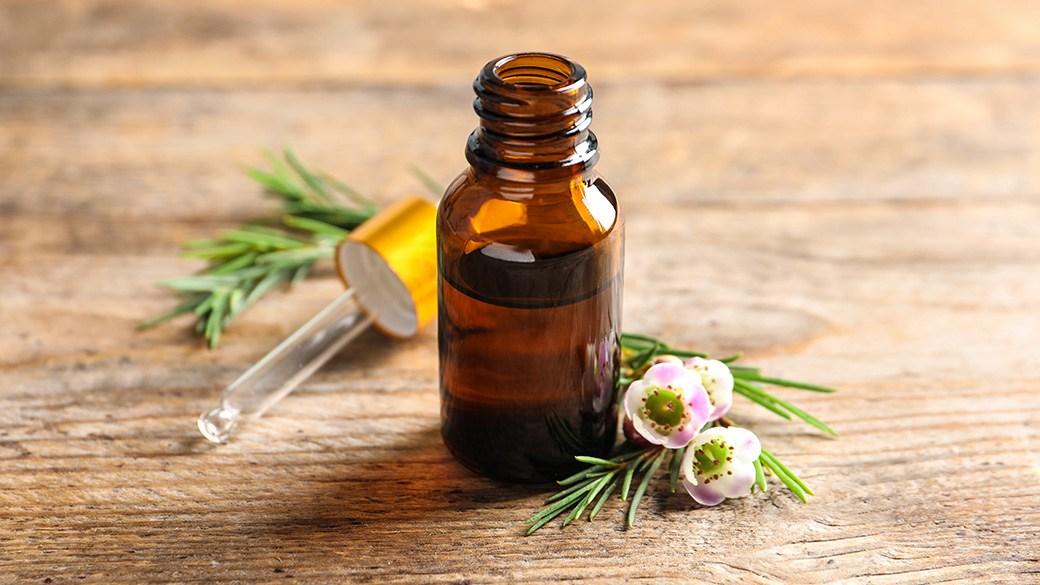Tea tree oil
Tea tree oil is a natural household staple loved for its wide range of uses and benefits, from skincare to haircare to antifungal treatment. Its versatility and efficacy are unmatched by other natural solutions, and you can incorporate it into your routine in several ways.
Read on to learn about the benefits of tea tree essential oil and how you can utilize it most effectively for your needs. Our top pick, Artnaturals Tea Tree Oil, checks all boxes for potency, purity, origin and price.
Tea tree oil uses
Tea tree oil’s popularity stems mainly from its versatility, making it an excellent addition to any essential oil collection or medicine cabinet. Its antibacterial and anti-inflammatory properties make it an excellent natural alternative to synthetic products. Here are some of tea tree oil’s most common uses.
Acne
Tea tree oil is often used as an acne treatment. As an anti-inflammatory, tea tree oil can reduce the appearance of red spots. It’s also antiseptic and astringent, removing pore-clogging impurities and banishing the oily skin associated with acne.
For best results, wash your face with a gentle cleanser before treating your face with tea tree oil. Then, gently dab diluted tea tree oil onto your blemishes with a cotton round.
If you prefer, you can opt for a tea tree serum explicitly formulated for acne. These often include other beneficial ingredients such as salicylic acid and vitamins. We recommend TruSkin Tea Tree Clear Skin Serum.
Dandruff and other hair and scalp concerns
Tea tree oil is often used to treat dandruff and other dry or oily scalp conditions and has an overall cleansing, reparative and shine-supporting effect on hair.
For best results, dilute tea tree oil with another carrier oil like almond oil or warm coconut oil in a 1 to 10 ratio.
If you don’t wish to mix your own oil before application, you can also consider purchasing a tea tree shampoo to apply tea tree oil directly to your scalp.
Athlete’s foot and other fungal infections
To treat athlete’s foot with tea tree oil, mix the tea tree with a carrier oil in a 1:4 ratio. Apply it to your feet twice a day. Alternatively, you can also apply a premade tea tree oil antifungal foot cream if you don’t want to make your own salve.
For nail fungus, create a foot soak by adding five drops of tea tree essential oil to half an ounce of carrier oil and adding the solution to a bucket of warm water. Soak your feet for twenty minutes. Alternatively, consider a premade tea tree foot soak.
Cuts and scrapes
Mix one drop of tea tree oil with one teaspoon of carrier oil and apply directly to the cut or scrape. Tea tree oil may accelerate skin healing and reduce the appearance of scars. Never use tea tree oil on open wounds.
What to look for when you buy tea tree oil
Bottle style and color
Choose a bottle with a dropper for ease of application and precise dispensing.
Look for a dark brown glass bottle. Light exposure affects the stability of essential oils by accelerating oxidation. For this reason, you should also store your essential oils in a cool, dark and dry place.
Quality
Look for a tea tree oil that is indicated to be natural, organic and pure and includes a USDA Organic label, such as this one from Nexon Botanics.
Organic tea tree essential oil will contain higher levels of Terpinen-4-ol, an antibacterial compound that provides tea tree many of its healing qualities, than nonorganic tea tree oil.
Diluted essential oils are less potent and won’t consistently deliver the same benefits as pure tea tree oil. Check the label to be sure it indicates 100% purity.
Tips for using tea tree oil
Never ingest tea tree oil. Ingesting tea tree oil can lead to gastrointestinal issues and other severe reactions.
Diffuse tea tree oil in an essential oil diffuser to cleanse the air in your space.
Add a few drops of tea tree oil to your bath water to soothe and relieve irritated skin.
Add a drop of tea tree oil to your toothpaste each time you brush to reduce bacteria in your mouth and freshen your breath. You can purchase a tea tree toothpaste to use tea tree oil for dental hygiene.
How much you can expect to spend on tea tree oil
A 4-ounce bottle of tea tree oil ranges in price from $10-$30. Cheaper essential oils tend not to be 100% pure and are distilled from nonorganic sources. Higher-end tea tree essential oils will be sourced from Australia and labeled as 100% pure, natural and premium therapeutic.
Tea tree oil FAQ
Is tea tree oil safe?
A. Most people won’t experience any issues using tea tree oil. As is the case with any essential oil, some people will experience allergic reactions. You should always dilute essential oils before application and do a test on a small patch of skin before applying to your body. Signs of allergic reactions include itchiness, irritation, burning and stinging.
Can I use tea tree oil to treat head lice?
A. While some people believe tea tree oil can kill lice, there’s no conclusive evidence for this. However, according to Healthline, some early studies suggest it may be used as a preventative measure and may even kill lice in their earliest stages.
To use tea tree oil as a preventative measure for lice, apply a few drops of diluted oil directly to your scalp. You can also use a tea tree shampoo to apply tea tree oil directly to your scalp in the shower.
What’s the best tea tree oil to buy?
Top tea tree oil
What you need to know: This all-natural, 100% pure tea tree oil lives up to its high ratings for its uniform consistency and high robustness.
What you’ll love: It’s distilled from tea tree leaves harvested from Australia and contains no synthetic ingredients.
What you should consider: Its potent, earthy tea tree scent is characteristic of high-quality tea tree oil, but it may be a little strong for some.
Top tea tree oil for the money
What you need to know: A budget-friendly tea tree essential oil formulated to be safe to use directly on the skin for the treatment of cuts, scrapes and bites.
What you’ll love: It is a good choice for the money and comes in a larger volume than many other tea tree essential oil options. It can be applied at full strength or diluted.
What you should consider: Some have noted it’s a bit runnier than your typical tea tree essential oil. This is because it also contains deionized water, SD-40 alcohol and polysorbate-60, making it thinner in consistency than is typical of essential oil.
Worth checking out
Healing Solutions Tea Tree 100% Pure Therapeutic Grade Essential Oil
What you need to know: This small bottle of tea tree essential oil packs a surprising punch, with high ratings and buyer success stories in the treatment of acne, rosacea and foot fungus.
What you’ll love: It’s therapeutic-grade and it comes in a convenient bottle with a dropper cap.
What you should consider: It comes in a small bottle and wouldn’t be an economical option for someone who intends to purchase tea tree oil for everyday use.
Prices listed reflect time and date of publication and are subject to change.
Check out our Daily Deals for the best products at the best prices and sign up here to receive the BestReviews weekly newsletter full of shopping inspo and sales.
BestReviews spends thousands of hours researching, analyzing and testing products to recommend the best picks for most consumers. BestReviews and its newspaper partners may earn a commission if you purchase a product through one of our links.












